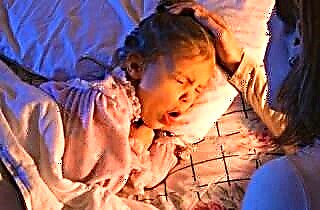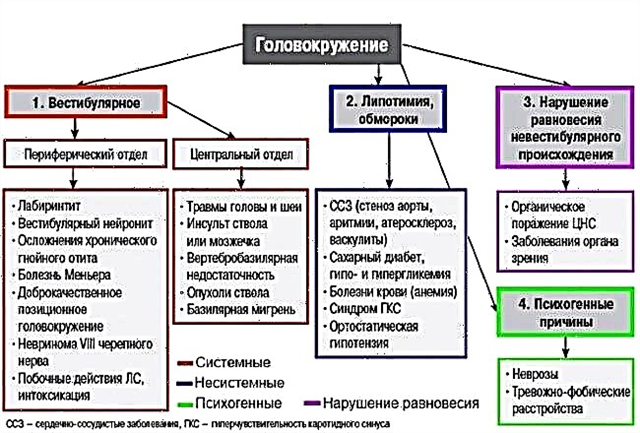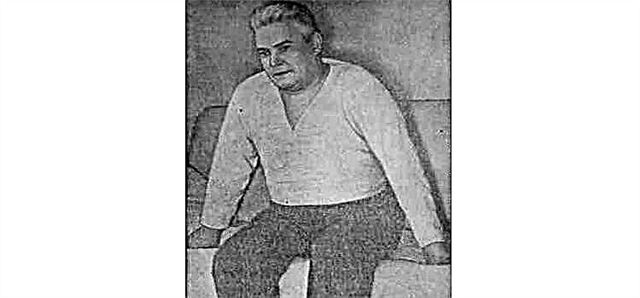A child who constantly coughs is always anxiety for parents. And rightly so - the cough does not arise out of the blue. It is always a reflex response to a stimulus, external or internal. Although young children under one year old can cough even when they are completely healthy. For them, this is a way of cleansing the nose and larynx of accumulating saliva and mucus, which he has not yet learned to swallow constantly.
Physiological cough
 A constant dry cough in a child cannot be physiological. It indicates the presence of an infectious disease or permanent irritation of the larynx. You can distinguish a physiological cough from a pathological one by the following features:
A constant dry cough in a child cannot be physiological. It indicates the presence of an infectious disease or permanent irritation of the larynx. You can distinguish a physiological cough from a pathological one by the following features:
- it is not strong, even if dry;
- is not paroxysmal;
- appears more often at night or after sleep;
- the child feels good, moves actively, eats normally;
- there are no symptoms associated with respiratory diseases;
- the child coughs no more than 15-20 times a day;
- not accompanied by suffocation or signs of oxygen deficiency.
Usually, a physiological cough disappears by the age of one year, since the child begins to move more actively, the sputum leaves better, and he is able to clear his nose on his own.
Residual
Often, a prolonged dry cough in a child's mother is attributed to residual effects after suffering respiratory diseases, especially in cases where it is not accompanied by an increase in body temperature. Moms believe that the cough will go away on its own, and do not pay attention to it, and the child can continue to cough for several months.
 This situation is unacceptable. Residual cough normally lasts no more than 2 weeks, a child with a weakened immune system can cough for a month. If the cough lasts longer, it is considered chronic. This is a signal that the main cause of the cough has not been eliminated, or there is another one that could not be found out.
This situation is unacceptable. Residual cough normally lasts no more than 2 weeks, a child with a weakened immune system can cough for a month. If the cough lasts longer, it is considered chronic. This is a signal that the main cause of the cough has not been eliminated, or there is another one that could not be found out.
Residual cough is rarely very dry, barking. This is a mechanism by which the body is freed from phlegm residues or irritation syndrome of mucous membranes that have not yet recovered. Every day, this cough becomes weaker, and gradually disappears without any treatment. And if you help the body with folk remedies for cough, it goes away even faster.
Pathological
Pathological persistent dry cough has infectious and non-infectious causes. Non-infectious include:
- Laryngeal irritation. External irritants can be dry or very cold air, smoke and strong odors, dust, fine sand, food that is too hot or spicy. With prolonged exposure, the mucous membranes of the respiratory system are constantly irritated, the child has a tickling and twitching throat, he constantly coughs, and sometimes a dry cough rolls in painful attacks.
- Allergic reaction. A strong one is accompanied by a moist cough. It is less traumatic for a child, and such a cough is easy to recognize by edema, profuse snot flow, redness of the eyes. Worse, when the effect of the allergen is weak, then the external reactions are implicitly expressed, and it is the incessant coughing that gives the allergy. If the allergen is not found and eliminated, bronchial asthma gradually develops.

- Chronic diseases. A persistent cough can be caused not only by respiratory diseases (pneumonia, bronchitis, tracheitis). This symptom is typical for heart failure, reflux, gastritis with high acidity. It is possible to determine the disease by passing a diagnostic examination, and to suspect it - according to the accompanying signs typical for each of them.
- Genetic and congenital diseases. Cystic fibrosis, lung atrophy and emphysema, etc. Usually they appear in early childhood, but up to a year are rarely found, since coughing is typical for infants. These diseases are incurable, you can temporarily eliminate the cough with the help of special drugs, which have to be taken throughout the patient's life.
- Oncology. Oncological diseases of the respiratory system are rapidly growing younger. This is due to poor ecology, polluted air and water, an abundance of carcinogens in food, and frequent man-made disasters. A characteristic sign of the presence of neoplasms in the respiratory organs is a constant dry cough, during attacks of which a small amount of mucus with bloody inclusions is sometimes coughed up. An accurate diagnosis can only be made on the basis of a biopsy.
An infectious cough occurs when pathogens enter the body that are causative agents of respiratory or broncho-pulmonary diseases: whooping cough, diphtheria, scarlet fever, tonsillitis, bronchitis, pneumonia, tuberculosis, etc. It becomes permanent in the absence of proper treatment, after the disease passes in a chronic form.
Potions and syrups
Syrups and potions are best used to relieve dry cough attacks. You can buy them at the pharmacy or use folk recipes.
A doctor should select pharmaceutical preparations, since in some cases only antitussives can stop a dry cough. But there are situations when their use is categorically contraindicated (for example, when sputum accumulates in the lungs or bronchi).
Plant-based expectorant syrups are practically harmless: Ambroxol, Herbion, Lazolvan, Doctor MOM, Plantain Syrup, etc. With a dry cough caused by bronchial spasms, drugs with a bronchial dilating effect give a good effect: Bronhosan "," Bromhexin "," Bronholitin ", etc.
An excellent remedy that helps to eliminate a prolonged residual cough is "Stopussin" - a combination drug that simultaneously eliminates cough and facilitates the discharge of thick sputum.
At home, you can also make healthy syrups:
 Onion. Peel 2 large white onions and chop thoroughly. Transfer to an enamel saucepan and cover with a glass of sugar. When the juice goes, put on low heat and, stirring constantly, cook until caramelized. Strain, add a tablespoon of honey, stir and give a teaspoon several times a day.
Onion. Peel 2 large white onions and chop thoroughly. Transfer to an enamel saucepan and cover with a glass of sugar. When the juice goes, put on low heat and, stirring constantly, cook until caramelized. Strain, add a tablespoon of honey, stir and give a teaspoon several times a day.- Anise water. Pour a tablespoon of anise seeds with a glass of water, boil for 10 minutes, pour into a thermos. When cool, strain, add a tablespoon of honey. Give a teaspoon 3-4 times a day.
- Pink syrup. Suitable even for the smallest. Pour sugar syrup over two glasses of tea rose petals (1 cup each sugar and water, bring to a boil). Simmer until the syrup is thick and brownish. Add a little lemon juice, cool, give half a teaspoon during a coughing fit.
- Rosehip syrup. Better to use a pharmacy. It perfectly strengthens the immune system, neutralizes toxins, has an anti-inflammatory effect, and stimulates the regeneration of mucous membranes. Give a teaspoon 3-4 times a day.
- Cornel jam. Cornel berries are a real storehouse of vitamins necessary for a recovering child: A, E, C and microelements. You can give it from 6 months, but first remove the bones. For babies, you can dilute the syrup in half with water and give it a drink.
Honey mixed with ghee can quickly stop an attack of a strong dry cough. A small amount of such a mixture just needs to be put under the tongue and slowly dissolve. It forms a softening mucous protective film, has antibacterial and anti-inflammatory properties.
Complex therapy
 Untreated or newly diagnosed infectious diseases that have caused a persistent dry cough require complex intensive therapy, which should only be prescribed by a doctor. It consists of several groups of medications, auxiliary folk remedies. In the mild period, warming up, inhalations and other physiotherapeutic procedures are connected.
Untreated or newly diagnosed infectious diseases that have caused a persistent dry cough require complex intensive therapy, which should only be prescribed by a doctor. It consists of several groups of medications, auxiliary folk remedies. In the mild period, warming up, inhalations and other physiotherapeutic procedures are connected.
Coughs can be triggered by bacteria, viruses, or fungal infections. And each type of microorganism can be destroyed only by drugs aimed specifically at them. That is why the use of antibiotics without a doctor's prescription is unacceptable. With a fungal infection, they will create favorable conditions for its further prosperity. And in some cases, they can cause severe allergies.
In parallel with drugs that destroy pathogenic microflora, they are prescribed if necessary: anti-inflammatory, antihistamines, mucolytic, antipyretic, immunomodulators and others. Their dosages are calculated individually, depending on the age, weight, and health status of the child.
No self-medication in this case is inappropriate! It will only prolong the disease and allow it to penetrate deep into the body.
All medical recommendations must be strictly followed. If something in the prescriptions causes you rejection or doubt, you should discuss this with your doctor before starting treatment, and not cancel the drugs yourself.
Prophylaxis
To prevent children from coughing, they need good nutrition, the correct daily regimen and tempering procedures. Only then will the child's immune system be able to provide reliable protection against pathogenic microorganisms, and he will not constantly get sick with ARVI and colds. It is unlikely that it will be possible to protect the baby in this way from more serious infections. But even their strong child will be much easier to bear than a weakened one.
To prevent a lingering pathological cough, simple preventive measures will help:
 a cold cough must be treated to the end, stop treatment with folk remedies only after the complete disappearance of all symptoms;
a cold cough must be treated to the end, stop treatment with folk remedies only after the complete disappearance of all symptoms;- in the treatment of infectious diseases, carry out all medical prescriptions, do not make independent adjustments to the course of therapy;
- regularly ventilate the room in which the child is, monitor the cleanliness and humidity of the air in the room;
- remove from the baby's room all objects that collect dust: carpets, fleecy bedspreads, from the crib - large soft toys;
- do not store or use perfumery with a strong odor, household chemicals with chlorine and other hyperactive substances in the child's room;
- there should not be too many indoor flowers - they "take" oxygen at night, remove all ferns, poisonous and strong-smelling flowers;
- if there is an animal in the house, thorough cleaning using a vacuum cleaner is required at least 3 times a week;
- the only reason for refusing to walk may be high temperatures or very bad weather conditions (thick fog, heavy rain, harsh wind, frost below -10 degrees).
These measures will speed up the healing process and prevent a prolonged dry cough in a child. They help to strengthen the immune system, prevent allergies and help to quickly restore the mucous membranes damaged after the disease.


 Onion. Peel 2 large white onions and chop thoroughly. Transfer to an enamel saucepan and cover with a glass of sugar. When the juice goes, put on low heat and, stirring constantly, cook until caramelized. Strain, add a tablespoon of honey, stir and give a teaspoon several times a day.
Onion. Peel 2 large white onions and chop thoroughly. Transfer to an enamel saucepan and cover with a glass of sugar. When the juice goes, put on low heat and, stirring constantly, cook until caramelized. Strain, add a tablespoon of honey, stir and give a teaspoon several times a day. a cold cough must be treated to the end, stop treatment with folk remedies only after the complete disappearance of all symptoms;
a cold cough must be treated to the end, stop treatment with folk remedies only after the complete disappearance of all symptoms;

